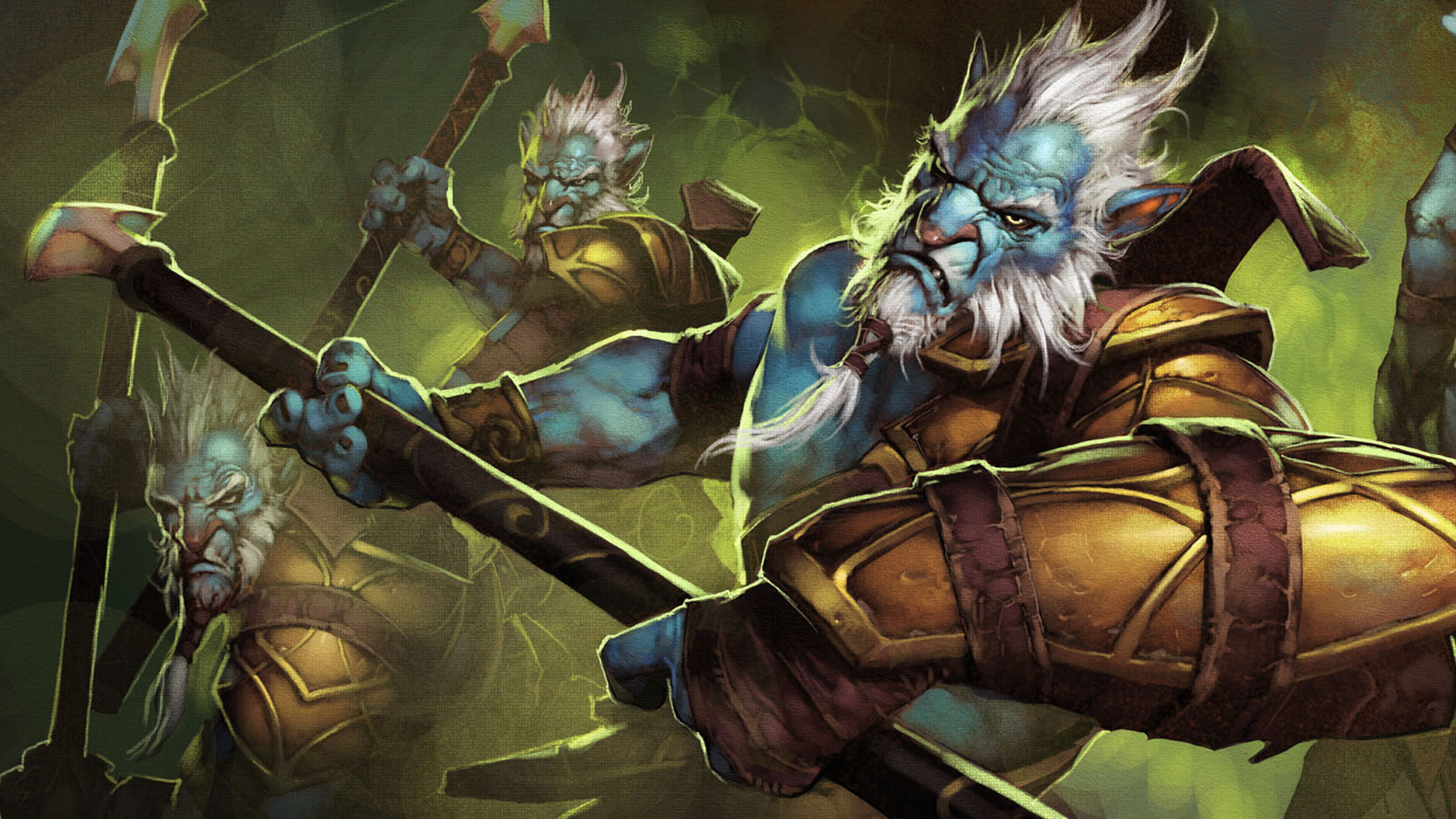Our Verdict
A deep and rewarding competitive game that becomes something special when taken on in the company of others.
PC Gamer's got your back
Dota 2 has changed significantly in the time since we published this review. Because of that, we've published a new review with up-to-date criticism. We've left this review here as a record of how we originally felt about Dota 2.
Of the half-dozen people I started learning Dota 2 with, three still play regularly. Though there are hundreds of thousands of players of our approximate skill level populating the matchmaking queues, the four of us are more like each other than we are like anyone else playing Valve's isometric wizard-'em-up.
Spending a year learning to shuffle a gaggle of fantasy heroes up Dota's teetering stack of rules and game mechanics will do that to you: we've developed a secret language of our own, one that runs parallel to the talk of creeps and lanes and farm and rax common to everyone who plays the game. “Whack a ward on the donkletron I'm going to stick one up their jungle” is a sentence I can say out loud and be completely understood by at least those three people. For some reason, there's also a lot of singing involved. It's a lot like being a sailor.
A few months ago I was playing Dota 2 with one of those friends. He was controlling Bristleback, a gnarled humanoid echidna who specialises in punishing attacking players with a faceful of spiny quills. I was Tusk, a sort-of-Scandinavian walrus Viking who can punch people so hard that the words 'WALRUS PUNCH!' are briefly writ in the sky.
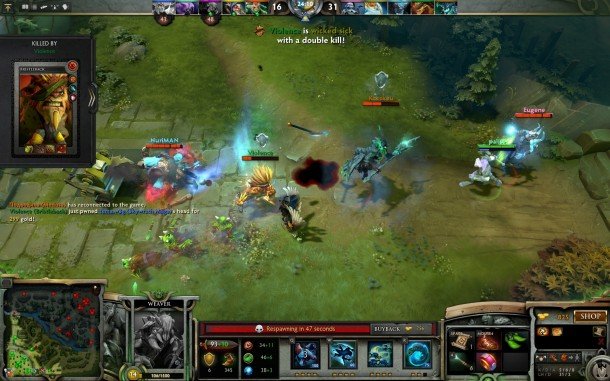
It wasn't an ideal pairing. We'd allowed the game to randomly select our heroes for us, a necessary risk if you're going to learn everything you need to know about Dota's hundred-plus playable characters. Of the five players on our team, it made the most sense for Bristleback and I to head to our faction's offlane: the most dangerous of the three pathways that funnel waves of AI-controlled 'creeps' from one side's base to the other. Each lane is dotted with defensive towers, and cracking these defences to expose the enemy 'ancient' forms the basis of Dota's strategic take on tug-of-war.
Bristleback and Tusk are both melee heroes, which meant we needed to get close to the creep line to score last hits – killing blows that dispatch enemy units for gold and experience. In doing so we made ourselves vulnerable to ranged fire from the enemy – ideally we'd have brought our own ranged character to even the odds.
We were also equally dependent on gathering gold to purchase new equipment. This wasn't ideal, either: every Dota hero needs to gather a different set of items to be effective, and normally teams will prioritise one hero over another when it comes to last-hitting lane creeps. The game indicates which heroes are likely to be played in which role, but whether that happens is something players have to arrange for themselves.
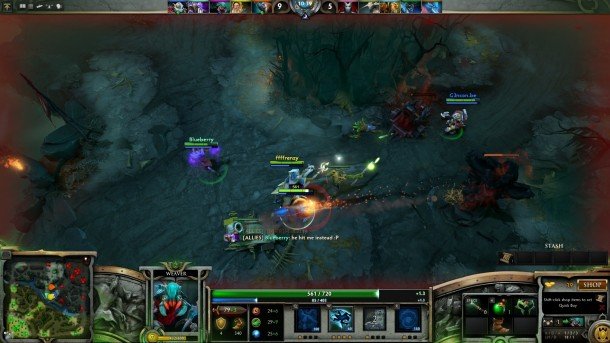
These are the politics of a nascent Dota match, and the pairing of Bristleback and I represented a backbench compromise. We did our best to split the last hits between us, nipping to the frontline whenever a creep was low on health and being careful to deny the enemy access to our own creeps by dispatching them ourselves. There was no avoiding the odd tussle with the two enemy players opposing us, however, and by the ten minute mark we were both running dangerously low on hit points.
We'd each spent some of our starting gold on a healing salve – a one-use, cost-ineffective way of restoring health that can be cast on your own character or on an ally. Having not bothered to look at each other's inventories, neither of us knew that we'd both bought one.
There was a brief moment of calm. Our creep line had advanced into the firing range of the first enemy tower, and it was too early in the game to have a go at knocking the defensive structure down. We backed off and waited a little way north of the river that bisects the map. I compared my health bar to my friend's and decided that he needed to stay in the lane longer than I did. I could run back to base, if I had to, and get my health back there at the expense of time and experience points. I pushed the hotkey for my healing salve and pointed it at Bristleback, giving up my gold to keep him in the game.
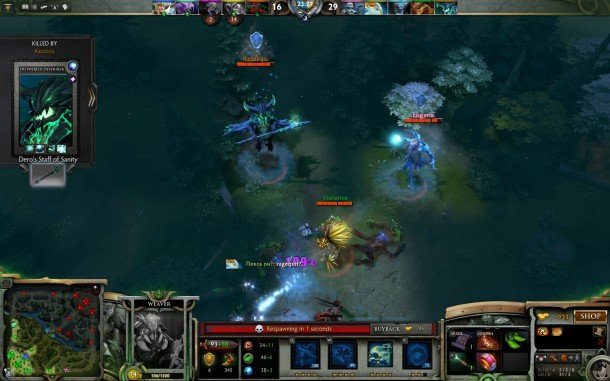
A few hundred real-world miles away, in the same instant, my friend compared his health bar to mine and decided that I needed to stay in the lane longer than he did. He hotkeyed his healing salve and pointed it at me, giving up his gold to keep me in the game. Green swirls of regenerative energy sprang from both of our characters in unison.
We laughed.
“Did... did we just salve each other?”
“Er, yeah. I think we did.”
“That isn't weird, is it?”
“I think it's fine. Nobody saw.”
If you're looking for a reason to commit time to Dota 2 – if you're actually reading this review for advice and a critical opinion, rather than to see what score I'm going to give the most popular game on Steam – then, first up, thanks for being here. Second, I want you to consider what it means when two grown men accidentally lather each other in regenerative goop. It's gaming's equivalent of holding a door open for somebody who is already reaching to hold the door open for you: a synchronicity of kindness that speaks to a deeper shared understanding of the situation both people are in. Dota is a game where you can say the words “are you thinking what I'm thinking?” and be reliably assured that the person on the other end of your VoIP connection actually is. It might have the systems and bearing of a videogame, but Dota shares the social impetus of a sport. Its single environment isn't a map , it's a pitch .
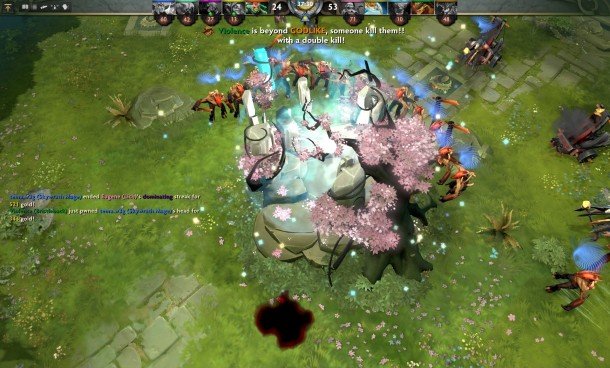
Dota 2 is a remake of Defence of the Ancients, the Warcraft III mod that laid out the principles of levelling up a hero, pushing lanes and knocking down towers. Many of the games that followed the original DotA sanded down its rougher edges in pursuit of new audiences or alternative business models. That's not the case here: this is the lane-pushing game in its original, most intricate form. Getting into Dota 2 means committing time to learning a game whose mechanics have been designed with complexity rather than accessibility in mind.
A suite of singleplayer tutorials explains the basics, and Valve have done well here to introduce some of Dota's more esoteric concepts alongside the familiar business of attacking enemies, using items and deploying skills. These tutorials are followed up with a series of bot matches using a limited pool of heroes that eventually opens up into full online play. It's inevitable, however, that new players will feel unprepared for their first proper match: like any sport, experience is a better teacher than time spent practising in isolation.
It helps that it's fun. Hero abilities are impactful and satisfying to land, and scale well with the ability level of the player wielding them. Lion's Finger of Death power, for example, only requires you to click on the right enemy to see them obliterated by a searing bolt of lightning, and the satisfaction you receive from its use in your first hours with the game will be matched later when you land your first long-ranged Sacred Arrow with Mirana, a skillshot that scales in power the further it travels. As you become familiar with the surface details of the game you'll naturally start to understand its deeper complexities: the knowledge of turn rates, attack animations and stat scaling that become important at higher levels of play.
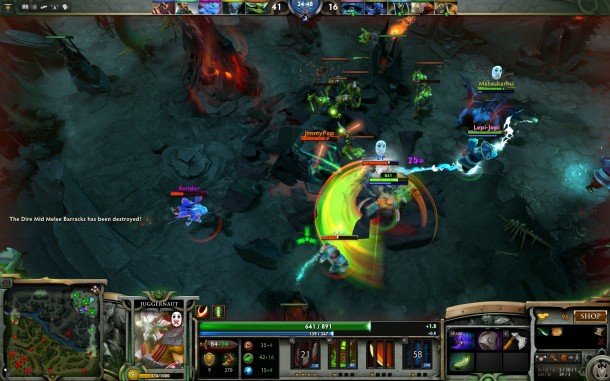
There's something tremendously rewarding about learning to play Dota. Part of this is the vast amount of information you're asked to absorb: the abilities, items, rules, situations and solutions that constitute its secret language. Then there's the application of that knowledge, the clutch choices that determine the outcome of skirmishes, sieges and ultimately the game. Victory feels like a genuine accomplishment in a way that it doesn't in the vast majority of other games, because of the sheer number of variables in play: the best matches are like passing through a storm of chance and chaos with four other people and emerging from the other side clutching a win and, if you're lucky, a couple of new hats.
Then there's losing. Defeat is a necessary part of the equation – without it, those victories mean nothing – but it stings, and for every energising loss that teaches you something there's a drag-out, mood-crushing face-stomp. Just as winning becomes more meaningful when you feel like the game is testing you personally, so defeat will sometimes feel like having all of your personal failures writ large.
Certainly, there will be people who make it their business to tell you that you suck. I sometimes feel like the hostility of the Dota community is overstated, but there's no denying that abuse occurs with regularity. A mixture of competitive pressure, language barriers and anonymity create an environment where immature people feel like it's acceptable to say terrible things to one another. This isn't unique to Dota, but it's part of the experience and it'd be completely understandable if it put you off playing the game. The point, though, is that this negativity stems from the same forces that make the game so special: passion, expertise and personal investment. I bet sailors can be right pricks to each other sometimes, too.
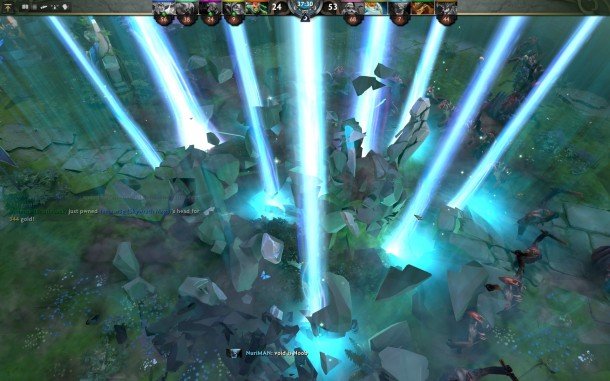
Valve have implemented systems to help police player behaviour, but it's an area where they could do more. You can commend or report players for a variety of respectively positive and negative behavioural traits – friendliness and leadership on one side, text abuse and intentional griefing on the other.
Commendations are listed on player profile pages as badges of honour, whereas receiving a sufficient amount of reports in a given period can result in players having their chat rights shut off for a variable amount of time. The effectiveness of the system is hard to judge, but it clearly hasn't been internalised by the community in the way that League of Legends' player tribunals have. It's common to see players – often the worst offenders – demanding that people be reported for simply having a bad game, while requesting commendations for themselves because they scored a lot of kills.
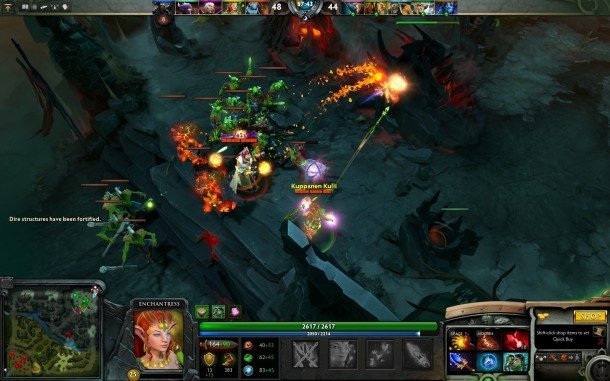
There's still a tremendous amount of good to the Dota community. You will, from time to time, be matched with great people or find yourself taking on enemies who have a sense of humour. Then there's the culture that surrounds the game – the endless in-jokes, the top-quality support for the professional scene and the depth of discussion surrounding mechanics and strategy. Community membership might not be something you download with the game client, but it's part of the package: if you're considering devoting a serious amount of time to Dota, these benefits have to be held in balance against the odd tangle with an internet dickhead.
Valve have matched the community's enthusiasm for its roster of characters with designs that match its superlative work on Team Fortress 2. Every hero has a distinctive silhouette and colour scheme, and absurdly in-depth writing and voice-acting peppers each match with personality and humour. “We should spar when this is over,” mutters Tusk, should he happen to wander into a lane alongside Bristleback. There's no reason for these throwaway dialogues to be in the game except that they're fun and they compound the feeling that no two games will ever be quite the same. I've played more than seven hundred matches, and I'm still hearing voice lines that I've never heard before.
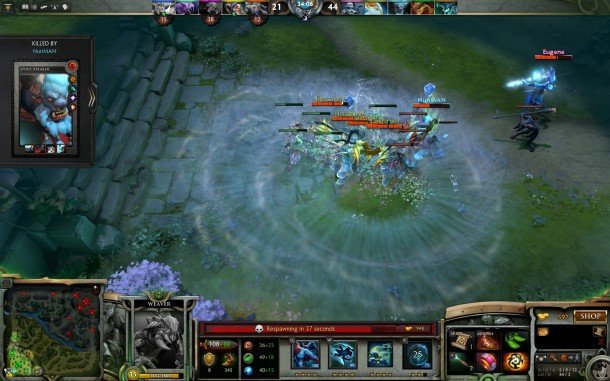
I can't think of another multiplayer game where that's the case. The community is intimately involved in the game's microtransaction system, too. Creators populate the store with cosmetic items that enable you to tweak the designs of your favourite characters, either by buying them directly, buying a key for a random loot chest, or by earning them through a post-match drop. The entirety of Dota 2's payment structure is bound up in cosmetics and ways to more deeply involve yourself in the e-sports scene: there are no heroes to buy and no premium account upgrades that affect the balance of play. Dota 2 is possibly the only competitive free-to-play game that is totally uncompromised by its business model.
Valve also deserve credit for Dota 2's standout e-sports support. Matches can be streamed in the client, enabling you to spectate directly alongside in-game commentators. You can earn item rewards by watching your favourite teams, and if you link your Steam and Twitch accounts you can do this while watching matches in a browser. And then there's the Compendium – a kind of betting book for the International tournament. It supports a pro-player collecting minigame that combines professional gaming with the mentality behind 1990s Panini football sticker books, in a way that is so obviously brilliant that it's astonishing that it took this long to be invented. The notion that someone entirely new to e-sports might receive a player card after a match, decide to look them up and become a fan is as exciting as it is eminently plausible.
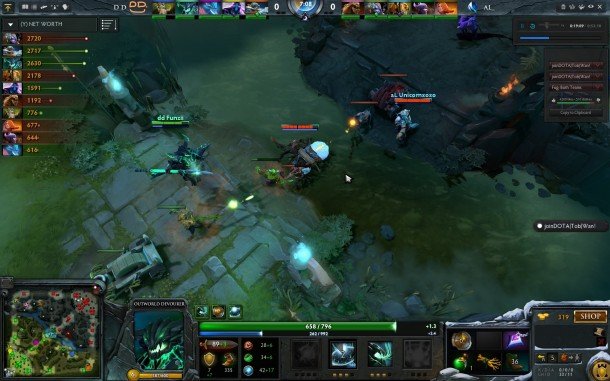
Dota 2 is in a strong place right now. It's rewarding and sociable like few other games, and despite its vast popularity it still feels like a secret waiting to be discovered. The next few months will be crucial: it's currently the best expression of Valve's progressive attitude towards players, and if it can continue on that track it describes a future for online gaming that is far more hopeful than the one we're used to.
That's the big picture, however. For me, Dota 2 will continue to be about the friends that I learned to play it with, the ones I've made through playing it, and that ceaseless, pointless singing.
A deep and rewarding competitive game that becomes something special when taken on in the company of others.
Joining in 2011, Chris made his start with PC Gamer turning beautiful trees into magazines, first as a writer and later as deputy editor. Once PCG's reluctant MMO champion , his discovery of Dota 2 in 2012 led him to much darker, stranger places. In 2015, Chris became the editor of PC Gamer Pro, overseeing our online coverage of competitive gaming and esports. He left in 2017, and can be now found making games and recording the Crate & Crowbar podcast.
